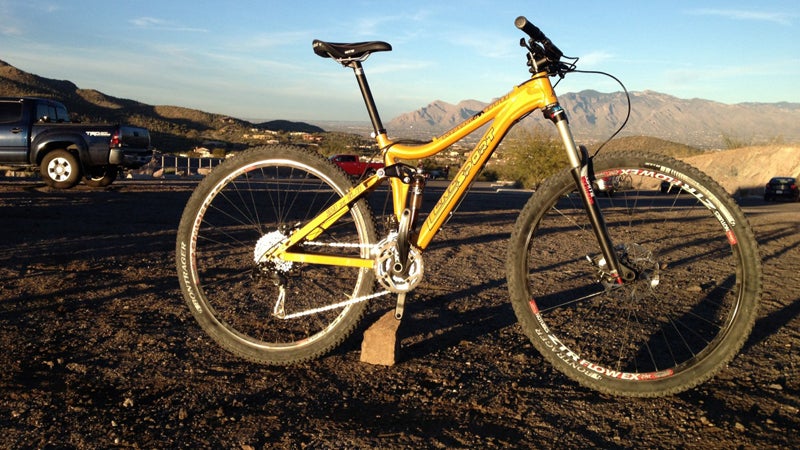We love how democratic the bicycle industry can be. Even though massive, multinational manufacturers like Giant and Trek dominate the industry with bike sales in the hundreds of thousands each year, boutique brands that offer good products can still hold their own.
Case in point: Fort Lupton, Colorado-based Lenz Sport Bicycles, the brainchild of Devin Lenz. Having built his first full-suspension bike in 1996 for himself, Lenz officially launched the brand the following year after friends began requesting frames. The equation was—and remains—a simple one: build around high-quality aluminum bikes made in the U.S.
Thanks to the urging of endurance racing legend Mike Curiak, Lenz entered the 29er market early on (back in 2004), and his frames became something of cult classics. He also built what was arguably the first long-travel 29er, a five-inch full-suspension design called the Lunchbox. It eventually morphed into a six-incher, which may not sound like a lot in the context of today’s rash of bigger bikes, but was groundbreaking in 2007.
So we were excited to try the company’s latest five-inch trail bike, the Mammoth, because we assumed with so many years of experience, it would be a pretty dialed-in ride. So far, our expectations have been spot on.
The frame is a full aluminum build that uses a linkage-driven single pivot, and although Lenz prefers to sell his bikes as naked frames, he obliged us with a complete bike. Our tester is equipped with a mix of mid-grade Shimano and SRAM components (XT, X9, X7), a White Brothers Loop fork, a Fox RP23 shock (leftover from last year’s stock), and No Tubes ZTR Flow EX wheels. Much like the frame itself, it’s a low-key, hard-working one-off build that puts the price tag at a not-unreasonable $4,900. The Mammoth frame alone runs $2,350.
At 28.6 pounds, our tester is not an extremely light bike, yet it feels much more nimble and deft than the weight suggests. It’s a surprisingly spry climber, with the rear end staying completely planted and maintaining incredible traction on big steps, techy moves, and rubbly, scree-covered trails on Tucson’s Starr Pass. Likewise, the steering is Exacto-sharp on steep descents, with the front end tracking as well, if not better, than bikes with much more travel. The high bottom bracket means there’s no issue with pedal strike, but it also makes for slightly less stable cruising on smooth, carving terrain.
Unlike many five-inch trail bikes these days, which can feel a bit anemic compared to the longer travel bikes out there, the Mammoth rides a lot bigger than its numbers suggest. And though the 120mm fork combined with a 69-degree head tube angle feel rock solid (especially on techy, rock-crawling style terrain), we’d be curious to slacken the front end up even more with a 140mm fork. We’d also love to spec this frame with higher-end components and carbon wheels, as we’re fairly sure it could be built to a lightweight 25 or 26 pounds.
Ride quality aside, we’re just glad there are still mom-and-pop shops like Lenz Sport building bikes that look, feel, and ride differently than the big-box brands. It’s not a bike for everyone (and Lenz probably couldn’t keep up with demand if the masses all suddenly wanted one of his bikes). But like any artisan product, the Mammoth will make a small contingent of riders happy to get out and ride more. And that, in our opinion, is what it’s all about.

